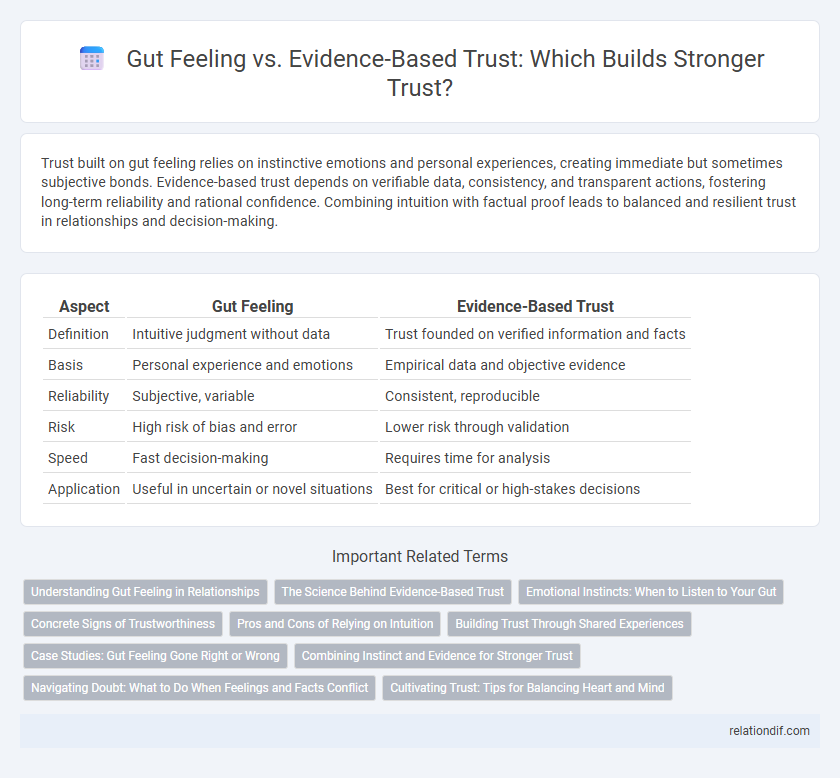Trust built on gut feeling relies on instinctive emotions and personal experiences, creating immediate but sometimes subjective bonds. Evidence-based trust depends on verifiable data, consistency, and transparent actions, fostering long-term reliability and rational confidence. Combining intuition with factual proof leads to balanced and resilient trust in relationships and decision-making.
Table of Comparison
| Aspect | Gut Feeling | Evidence-Based Trust |
|---|---|---|
| Definition | Intuitive judgment without data | Trust founded on verified information and facts |
| Basis | Personal experience and emotions | Empirical data and objective evidence |
| Reliability | Subjective, variable | Consistent, reproducible |
| Risk | High risk of bias and error | Lower risk through validation |
| Speed | Fast decision-making | Requires time for analysis |
| Application | Useful in uncertain or novel situations | Best for critical or high-stakes decisions |
Understanding Gut Feeling in Relationships
Gut feeling in relationships refers to the intuitive sense or emotional response that guides trust without relying on explicit evidence or rational analysis. This instinctual trust often arises from subconscious pattern recognition and past experiences, influencing decisions about honesty and reliability. Balancing gut feeling with evidence-based trust enhances relationship stability by combining emotional insight with objective information.
The Science Behind Evidence-Based Trust
Evidence-based trust relies on quantifiable data, such as past behavior patterns and measurable outcomes, to establish reliability and predict future actions. Neuroscientific studies demonstrate that the brain activates specific regions, like the prefrontal cortex, when processing evidence-based trust, which enhances rational decision-making. Incorporating empirical evidence reduces cognitive biases linked to gut feelings, resulting in more consistent and verifiable trust assessments.
Emotional Instincts: When to Listen to Your Gut
Emotional instincts play a crucial role in building trust when immediate decisions are required, as gut feelings often arise from subconscious pattern recognition rooted in past experiences. However, evidence-based trust provides a more reliable foundation by relying on objective data and verified interactions that minimize bias and emotional distortions. Balancing intuitive judgments with factual information enhances decision-making accuracy and fosters more resilient relationships.
Concrete Signs of Trustworthiness
Concrete signs of trustworthiness include consistent behavior, transparency in communication, and delivering on promises, which provide tangible evidence beyond gut feelings. Evidence-based trust relies on verified actions and reliable patterns that reduce uncertainty and build confidence in relationships or decisions. Monitoring accountability and responsiveness offers clear indicators that reinforce trustworthiness more effectively than intuition alone.
Pros and Cons of Relying on Intuition
Relying on intuition fosters quick decision-making and leverages subconscious pattern recognition, offering advantages in situations with limited data or time constraints. However, intuitive trust can be biased, subjective, and prone to errors due to emotional influence and cognitive shortcuts. Evidence-based trust, grounded in objective data and verified outcomes, enhances reliability and reduces risk but may delay decisions and overlook contextual subtleties captured by gut feelings.
Building Trust Through Shared Experiences
Building trust through shared experiences enhances relational bonds by combining gut feelings with evidence-based trust. Consistent positive interactions create a reliable foundation that validates intuitive trust and strengthens confidence in others' intentions. Over time, these shared moments generate mutual understanding and reinforce long-term trustworthiness.
Case Studies: Gut Feeling Gone Right or Wrong
Case studies reveal that gut feelings can lead to both successful and flawed trust decisions depending on context and available information. In high-stakes scenarios such as emergency response or business negotiations, instinctive trust often speeds decision-making but risks bias without supporting evidence. Conversely, evidence-based trust grounded in data and past performance typically produces more reliable outcomes, especially in complex or unfamiliar situations.
Combining Instinct and Evidence for Stronger Trust
Combining gut feeling with evidence-based trust creates a more balanced and resilient foundation for decision-making. Instinct provides immediate, intuitive insights while evidence grounds those insights in verifiable facts, enhancing credibility. Leveraging both emotional intelligence and data-driven analysis leads to stronger, more reliable trust in personal and professional relationships.
Navigating Doubt: What to Do When Feelings and Facts Conflict
Navigating doubt requires balancing gut feeling with evidence-based trust, as relying solely on intuition can lead to biased judgments while ignoring emotions may overlook crucial personal insights. Research in cognitive psychology emphasizes the importance of combining subjective feelings with objective data to make well-rounded decisions. Effective trust-building involves acknowledging emotional cues while critically evaluating factual information to resolve conflicts between feelings and facts.
Cultivating Trust: Tips for Balancing Heart and Mind
Cultivating trust requires harmonizing gut feelings with evidence-based insights to create authentic and reliable relationships. Emphasizing transparency, active listening, and consistent behavior fosters confidence while validating instincts with factual information enhances decision-making. Balancing emotional intuition and empirical data strengthens mutual understanding and long-term trust in personal and professional interactions.
Gut feeling vs evidence-based trust Infographic

 relationdif.com
relationdif.com